Iraq Denies Iran’s Claims About Mossad Presence In Erbil
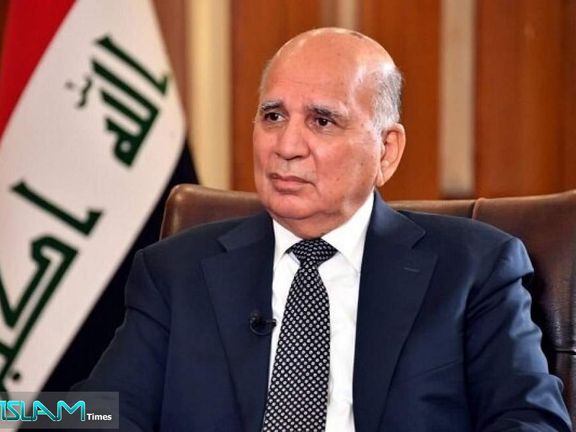
Iraqi Foreign Minister Fuad Hussein has denied Iran's allegations that The Israeli Mossad is present in Erbil, stressing that Iran must refrain from attacks on the capital of Iraqi Kurdistan.

Iraqi Foreign Minister Fuad Hussein has denied Iran's allegations that The Israeli Mossad is present in Erbil, stressing that Iran must refrain from attacks on the capital of Iraqi Kurdistan.
In a televised interview on Saturday, Hussein said Baghdad did not find any evidence that a site Iran bombarded in March was being used by Israel’s Mossad.
Calling on the Islamic Republic to provide evidence regarding Israeli presence in Erbil, he said, "If Iran has evidence, it must show it. Iran suggested sending an investigation committee but it never came.”
He also rejected Iran’s claim that it provided information to the Iraqi intelligence before the bombardment, saying that Baghdad did not receive any information related to the presence of Israeli elements in the area.
The Iraqi foreign minister urged Iran not to repeat such attacks, highlighting that “We find it strange that Iran chose the Kurdistan region to respond to Israel.”
In March, Iran fired missiles at Erbil. No one was killed but missiles did damage to some residential buildings. Iran claimed it used 12 ballistic missiles in that attack and targeted an Israeli intelligence center. At the time it was seen as a response to an Israeli airstrike in Syria that had killed two IRGC officers or to a suspected Israeli attack in February on a drone base at an airfield in western Iran.
Last week on Wednesday, a drone exploded in Erbil injuring three people and damaging several cars, according to a statement by Kurdistan's counter-terrorism service. The explosive drone detonated on Pirmam road in Erbil's outskirts.
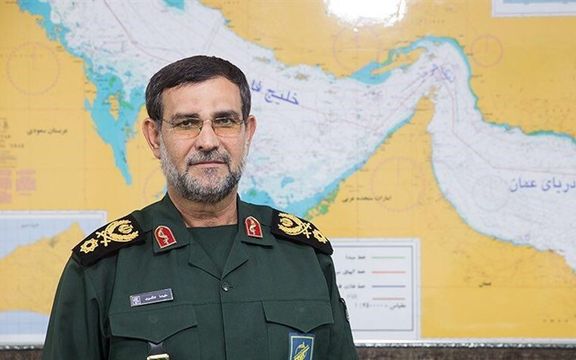
Whoever allows Israel to establish presence in the Persian Gulf will encounter security problems, Iran's IRGC Navy commander warned neighbors on Saturday.
Arab countries such the United Arab Emirates and Bahrain that established full relations with Israel in 2020, have expanded ties, including close intelligence and security cooperation.
Admiral Alireza Tangsiri said, “Today there is satisfactory security with cooperation among neighboring countries in the geographical area of the Persian Gulf,” but if for whatever reason someone allows “the number one enemy” into the region, it will create “chaos and instability” both for itself and for the region.
Israel and Persian Gulf Arab states have long been concerned over Iran’s nuclear program and adventurist regional policies, as well as its rapid expansion of missile technology. They supported former US president Donald Trump’s withdrawal from the Obama-era nuclear agreement and imposition of tough sanctions on Tehran.
But President Joe Biden’s entrance into the scene in 2021 changed the close coordination that existed during the Trump administration, especially between the US and Saudi Arabia, the main Arab power in the region souring.
Biden announced early on that he wanted to revive the nuclear deal with Iran known as the JCPOA and reduced support for Saudi Arabia in the Yemen war, a proxy war with Iran.
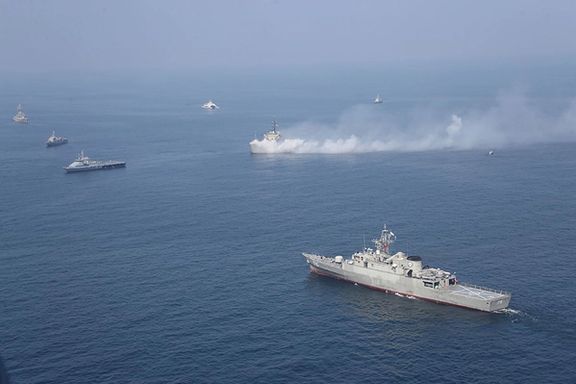
Tangisir’s speech on Saturday was not the first instance of warning issued to Arab states in the region. He had also made a similar statement in April, but since then Israel’s cooperation expanded with the Persian Gulf Arab states.
News also emerged on June 9, that a group of US lawmakers calling themselves supporters of the Abraham Accords, or the deal to establish ties between Israel and Arab countries, announced an initiative to create a united fron against Iran with Americans playing a central role.
The legislation proposes that the Pentagon works with Israel to integrate air defenses of six Gulf Cooperation Council countries of Bahrain, Kuwait, Oman, Qatar, Saudi Arabia, and the United Arab Emirates with Egypt, Jordan, and Iraq with the aim of thwarting threats from Iran and Iranian backed-militias across the region.
Reports also speak of secret talks to establish relations between Israel and Saudi Arabia, which has so far remained cool to the idea.
These efforts in effect would create what observers have long dubbed as an anti-Iran NATO and put further pressure on Tehran which remains largely isolated and under the pressure of US economic sanctions.
A year-long diplomatic process between Iran and world powers to revive the JCPOA and lift the sanctions stalled in March, as Tehran insisted on removing the IRGC from the US list of terrorist organizations.
In recent days other Iranian officials have also made statements emphasizing Iran’s military power and readiness to defend the Islamic Republic against threats.
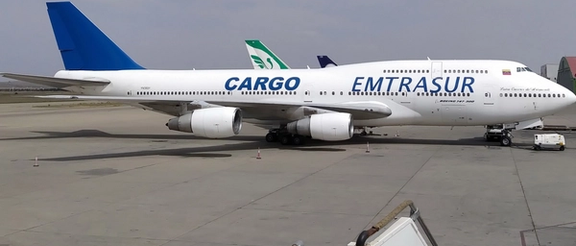
A Boeing 747 operating for the cargo division of Venezuelan national carrier Conviasa is stranded in Argentina for its links with Iran’s IRGC Quds Force.
Aníbal Fernández, Argentina’s security minister tweeted on Saturday that “The Government immobilized in Ezeiza [Airport in Buenos Aires] a Venezuelan plane sanctioned by the United States and withheld the passport of five Iranian crew members.” The tweet came after a local website leaked the news about the plane.
The plane was previously operating for Iran’s Mahan Airlines, sanctioned by the United States for its links to Tehran’s extraterritorial intelligence and secret ops outfit, the Quds (Qods) Force since 2008. The specific aircraft which belonged to French airlines since it entered service in 1986, was sold to Mahan Airlines in 2007 and apparently was later sanctioned by the United States.
Early in 2022, Venezuela’s Conviasa decided to set up a cargo division that came to be called Emtrasur Cargo and its first plane was the Boeing 747-300M bought or leased from Mahan airlines and christened ‘Louisa Caceres Arismendi.’ What is more interesting is that its next two planes were also supposed to be Mahan Airlines aircraft.
With close military and economic cooperation between Caracas and Tehran, the newly established cargo company could to be a joint venture.
However, a Mahan spokesman in Theran denied that the plane had any links with the company and said that it was "sold to Venezuela about a year ago."
The Boeing 747 flew from Mexico to Argentina on June 6, carrying automotive parts, but according to Argentinian media, someone knew something and decided to inspect the aircraft carefully, Aviacioline reported on June 11.
Although it turned out that there was no illegal cargo on board and the auto parts shipment were delivered to its recipient in Argentina, authorities became more suspicious that there were five Iranians and at least a dozen Venezuelans on board, with the Iranians not appearing in the passenger manifest. As a result, the passports of the Iranians were seized and all the passengers are reported to be in a hotel.
According to the same local sources, Argentina suspects that the Iranians are members of the Quds Force but are allowed to leave the country on regular scheduled flights.
But the fate of the plane is another story. No fuel company is willing to provide service to the aircraft for fear of third-party US sanctions. It tried to leave Argentina for Uruguay to get fuel, but had to turn back when permission was denied, according to Spanish-language news website Infobae.
The news about the aircraft emerged after an Argentinian opposition lawmaker, Gerardo Milman, submitted a request for information, citing “the enigmatic behavior of the flight, the confusing ownership of the aircraft and the composition of the crew.” On point that Milman has highlighted is that the Boeing 747 first flew to Cordoba from Mexico, ostensibly because of fog in Buenos Aires and a few hours later flew to its final destination, while its transponder was off.
It is not clear if the fog was the real reason why the plane diverted to Cordoba, and if its crew left the plane or not.
What is also not clear is who provided information to Argentina to carefully inspect the plane and its passengers. Apparently the Venezuelan cargo operation and this particular aircraft were under observation for some time.
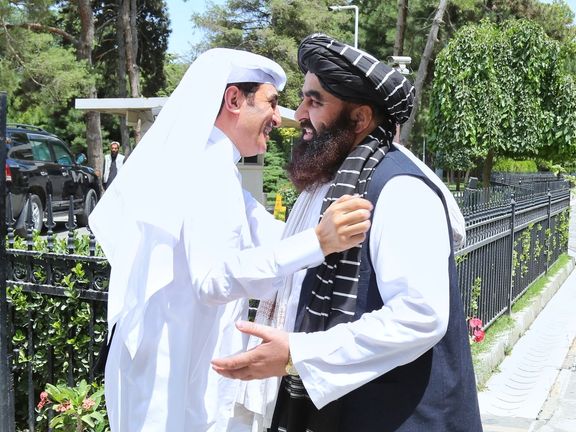
The National Security Advisor to the Emir of Qatar said Doha has strong ideological ties with the Taliban, during a meeting with Afghanistan’s acting interior minister.
Mohammed bin Ahmed al-Misnad of Qatar and Sirajuddin Haqqani met on Friday and discussed bilateral ties during the Qatari official's formal trip to Afghhanistan.
Al-Misnad and his accompanying delegation also held separate meetings with Foreign Minister Amir Khan Muttaqi, First Deputy Prime Minister Abdul Ghani Baradar, and Information and Culture Minister Mullah Khairullah Khairkhah, where they pledged Qatar’s continued cooperation in political and economic affairs with Afghanistan.
In his meeting with the Qatari delegation, Muttaqi called on Qatar to help Afghanistan in investment, economic growth, humanitarian aid, and counter-narcotics efforts.
“Now that security has been restored in Afghanistan, employment for the people has been created, it is time to show the world the actual picture of Afghanistan,” said Baradar, adding that the ground is now paved for Qatar and other regional and international allies to invest in infrastructure projects in the country.
Despite assurances by the Taliban, security has not been fully established in Afghanistan as armed opposition continues and the fundamentalist group continues enforcing draconian restrictions on individual and political freedoms.
This marks the first official visit to Afghanistan by a high-ranking Qatari delegation since the United Arab Emirates (UAE) took over the ground operations and aviation security contract at Kabul Airport.
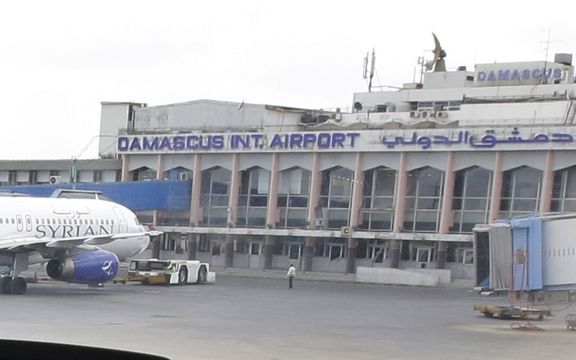
Iranian military officials and hardliner media have largely stayed silent over an Israeli attack on Damascus airport targeting Tehran’s assets on the ground.
Syria closed the Damascus International Airport on Friday “until further notice” after Israeli air strikes damaged the airstrip and a terminal, the transport ministry said.
Hardliner media in Tehran Saturday morning barely mentioned the attack, excpet carrying the condemnation of the Iranian foreign minister.
As the news about the Israeli raid spread, Mohsen Rezaei, a former chief commander of the Revolutionary Guard (IRGC) and a vice president in the government, said at a ceremony in Tehran Friday morning that “I wish Israel would dare to take a wrong step and give us an excuse, so we could eradicate it from this earth.”
But Rezaei, known for his boisterous comments, was not referring to the attack on the Damascus airport. His comments were a reaction to recent Israeli statements threatening to take action against the Islamic Republic.
The only Iranian reaction to Friday’s attack worth noting was the response of the foreign ministry. Foreign Minister Hossein Amir-Abdollahian condemned the attack as a "clear violation of Syria's sovereignty and territorial integrity... (and) contrary to international law and human principles", in a phone call with his Syrian counterpart Faisal Mekdad, Iran's state media reported.
Israeli attacks against the Damascus airport and targets in its vicinity said to house weapons and Iran-backed forces have been a regular occurrence in recent years.
But this time the attack seems to have been more direct and punishing. The transport ministry on Friday said the airport had stopped all flights, and a later statement said Israeli air strikes damaged the runway and one of the terminals.
“As a result of this damage, all arriving and departing flights at the airport have been suspended until further notice,” the ministry’s second statement said.
Maria Zakharova, Russia’s foreign ministry spokesperson, condemned the Israeli attack. “In this regard, we are forced to emphasize again that the ongoing Israeli shelling of the Syria territory … is absolutely unacceptable. We strongly condemn Israel’s provocative attack on critical Syrian civilian infrastructure,” Sputnik quoted a published statement as saying.
Last month, there were reports that Russia is withdrawing forces from Syria and possibly handing control of some bases to Iranian forces, because of its hard-pressed military situation in Ukraine.
There were also speculations if Israel will become more emboldened in taking action against Iran in Syria.
The Syrian Observatory for Human Rights said on Friday the Israeli bombing had damaged the runway after targeting "warehouses of Iranian militias" near the airport.
An Israeli military spokesperson declined to comment, Reuters reported.
For several years, Israel has been attacking what it has described as Iranian-linked targets in Syria, where Tehran-backed forces, including Lebanon's Hezbollah, have deployed to help President Bashar al-Assad. But there was clear political coordination with Russia, as former Israeli prime minister Benjamin Netanyahu visited Moscow multiple times and held long discussions with President Vladimir Putin.
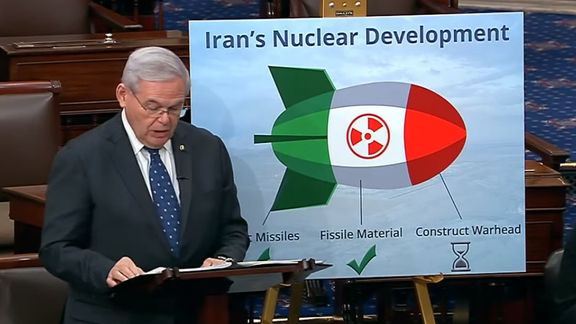
The US Senate Foreign Relations Committee has approved the Stop Iranian Drones Act (SIDA), which seeks to prevent Iran and Iran-backed militia groups from acquiring lethal drones.
In line with efforts to stop Tehran’s flourishing drone program, “the bipartisan legislation would amend the Countering America’s Adversaries Through Sanctions Act (CAATSA) to make clear that supporting the supply, sale or transfer to or from Iran of UAVs, or providing other assistance related to UAVs, is sanctionable under US law,” the committee Chairman Senator Bob Menendez (D-N.J.) and Ranking Member Jim Risch (R-Idaho) said in a statement on Thursday.
“As evinced by Iran’s drone attacks on Israeli shipping, Houthi attacks on Saudi Arabia and the UAE, and Iran-backed militia attacks on US facilities across Iraq... Iran’s reckless use and export of lethal drones to proxies and terrorist actors across the Middle East represents a significant threat to US national security and that of our allies and partners,” Menendez said, adding that “I look forward to working with my colleagues to ensure swift passage on the Senate floor and ultimate enactment of this bipartisan legislation into law.”
The House of Representatives passed the legislation late in April but it requires approval from the Senate and a presidential signature to become law.
“Iran’s regional terrorism continues to threaten not only the safety and security of our partners in the Middle East, but also American national security interests. Drones have rapidly become Iran’s weapon of choice,” Risch noted.